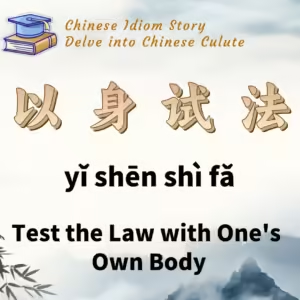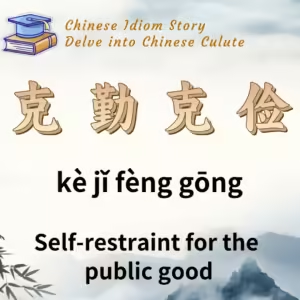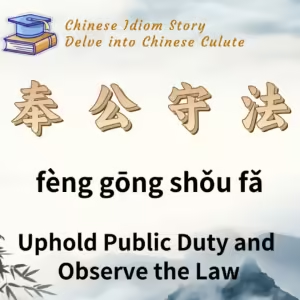
Chinese Idiom: 以身试法 (Yi Shen Shi Fa)
English Translation: Test the Law with One’s Own Body
pīn yīn: yǐ shēn shì fǎ
Idiom Meaning: This idiom describes the behavior of deliberately breaking the law, despite knowing it is prohibited, in order to experience the consequences firsthand.
Historical Source: Han Shu (《汉书·王尊传》)
Idiom Story
During the Western Han Dynasty, there was an honest and upright official named Wang Zun. Orphaned at a young age, Wang Zun was raised by his impoverished uncle. Despite the family’s financial struggles, Wang Zun loved reading and always took books with him while tending sheep in the fields. His admiration for officials who upheld justice led him to aspire to become such a person.
At the age of thirteen, Wang Zun asked his uncle to secure a position for him in the county jail. His uncle was astonished, questioning how a child, lacking understanding of legal matters, could work in a jail. Wang Zun responded that he had learned a lot from books and would gain practical knowledge from the jailer. Persuaded by Wang Zun’s persistence, his uncle arranged for him to work as an assistant to the jailer.
Over time, Wang Zun’s diligence and exposure to legal affairs led him to a position in the magistrate’s office, where he was further developed. After years of service, he studied Confucian classics and was subsequently appointed to various official positions, eventually becoming the governor of Anding Commandery.
Upon arriving in Anding, which was plagued by corruption and abuse of power, Wang Zun immediately set about reforming the administration. He instructed officials to be faithful to their duties and demonstrated through his own conduct that the law must be upheld. He warned against testing the law by personal example. When a particularly corrupt official was reported for extortion and failed to reform even after public notice, Wang Zun had him arrested. The official soon died in prison, and Wang Zun continued to punish other severe offenders. His reforms brought stability and order to Anding Commandery.
This story illustrates the meaning of “以身试法” by showing Wang Zun’s strict adherence to the law and the consequences for those who did not. The idiom has since come to represent the concept of personally facing the repercussions of one’s actions, especially when it involves breaking the law.






